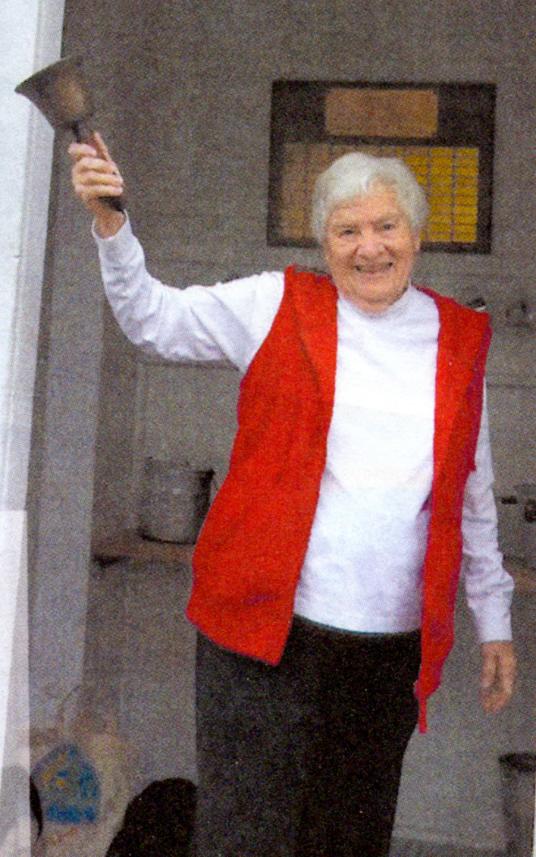Louise Bement 1933 - 2022
Dear Lansing Historical Association Members,
The Lansing Historical Association has been my great love since several board members and I organized it in 1988. After 34 years, while the passion is still there, I am no longer physically able to continue as president. I have written my last newsletter. If anyone would like to take over the job, please let me know.  When I retired from teaching sometime in the last century, there might have been an historical Association, but it had been inactive for a long time.
When I retired from teaching sometime in the last century, there might have been an historical Association, but it had been inactive for a long time.
Alice Bristol, Susan Howell Haring, and Isabelle Parish wrote extraordinary histories of Lansing and Ludlowville. Susan served unofficially as town historian from the 1930s until 1962; she did a good job. After Susan’s death in 1968, her many boxes of records were transferred to the town hall and stored in an inaccessible attic, either unbearably hot or cold depending upon the time of year.
When I needed to access the archives in order to write a book about Portland Point, I climbed a pull-down ladder into the attic of the town hall to access the material.
There was no one who could help me or knew what material the boxes contained. While the Town of Lansing had created an official position called the Susan Howell Haring historian, in actuality no one considered the immense and thankless task of cataloging the archives worth the miniscule salary that went with the position. There were other historians, but they did not put in the work that the position required.
The town clerk was nominally the historian for a time, but mostly she filed records and kept them organized. The town historian position was added to her other duties, which generally took priority over dusty piles of boxes in the attic. She had neither the time nor the interest to catalog or identify the materials that the town possessed.
My initial interest in the Portland Point material resulted in a Bicentennial history book, written by my fourth grade class, describing the cement industry that existed there and the immigrant families who made it possible. The students not only devoted themselves to working with the archives, but also devoted hours of afterschool time conducting interviews and assembling original materials.
Family members of many of the students had worked at the factories located at Portland Point and Salt Point. After years of being considered second-class citizens, it was a source of pride that someone was interested in their stories. Many students brought in oral histories and newspapers eagerly contributed by their families
For a teacher, there is no greater feeling than to give students, who were once written off as unmotivated or unintelligent, a reason to believe in themselves.
After observing how this project fostered such a love of learning in my students, I produced three other books with subsequent fourth grade classes. It was a lot work for both the students and me.
I soon realized Lansing needed an historical association, so I created one. I thought that having everything organized and catalogued would make writing my books easier.
When I took over, I relocated the archives wherever I could. Desperate for space, I used nearly every conceivable place I could identify for storage, including my house, a rented storage unit by the post office, and even the former one-room Schoolhouse 16 on Conlon Road before it burned. Irreplaceable pictures and historical records were everywhere. You can imagine what a jumble that was! I must have spent a year getting everything straightened out so that it was useful. I had a lot of help from the Tompkins County historical office.
Eventually, the Historical Association got so large and active that I asked the Town of Lansing to build an archive building for my records. I convinced the town that they could build an actual archive building for what they were paying for rent at the storage unit. The town already owned the property next to the one room schoolhouse and could siphon workers from the highway department to reduce costs.
Once the archive building was erected and I had acquired surplus furniture and filing cabinets from Cornell, I was finally able to have historical meetings and to store and preserve records. I obtained flat picture files for laying out maps and other things that needed to be laid flat. The project snowballed. Once people knew that I had a place to store records, through donations I accumulated more and more archival materials.
I like having the town history organized. It is wonderful to have an archive building that I can show off.
One thing I am very proud of is the historical scholarship award that the Association gives each year to a Lansing high school graduate planning to major in history in college. The Susan Howell Haring Scholarship was named after the first Lansing historian. I never had an opportunity to meet Susan, who died in 1968 shortly before I moved to Lansing. The Association owes a lot to Susan’s spirit and love of history. I thought it was important to remember Susan’s pioneering work by helping to launch new historians into the world.
The Lansing Historical Association has been my passion and love for many years. I am proud of everything we have accomplished in preserving and promoting Lansing’s past. I hope this important work will continue long after I am gone. Thank you for letting me share my love of learning with you. I will miss every one of you.
With all my heart,
Louise Bement
[Download a PDF copy of this letter]
